Imagine slipping on a pair of shorts that could make walking feel like a breeze, almost as if you’ve instantly shed 20 pounds. Sounds too good to be true, right? Well, get ready to have your mind blown! Scientists at the Technical University of Munich have cooked up something that might just change the game for anyone who’s ever wished walking was a little easier.
They call it the WalkON system, a pair of high-tech shorts that’s not your average gym wear. These bad boys can cut down the energy you need for a stroll or jog by up to 18%! Whether you’re a spring chicken or in your golden years, these shorts could be a game-changer, especially if stairs have become your nemesis or long walks leave you winded.
I’M GIVING AWAY A $500 GIFT CARD FOR THE HOLIDAYS – Ends today at 3 pm ET
Enter by signing up for my free newsletter.
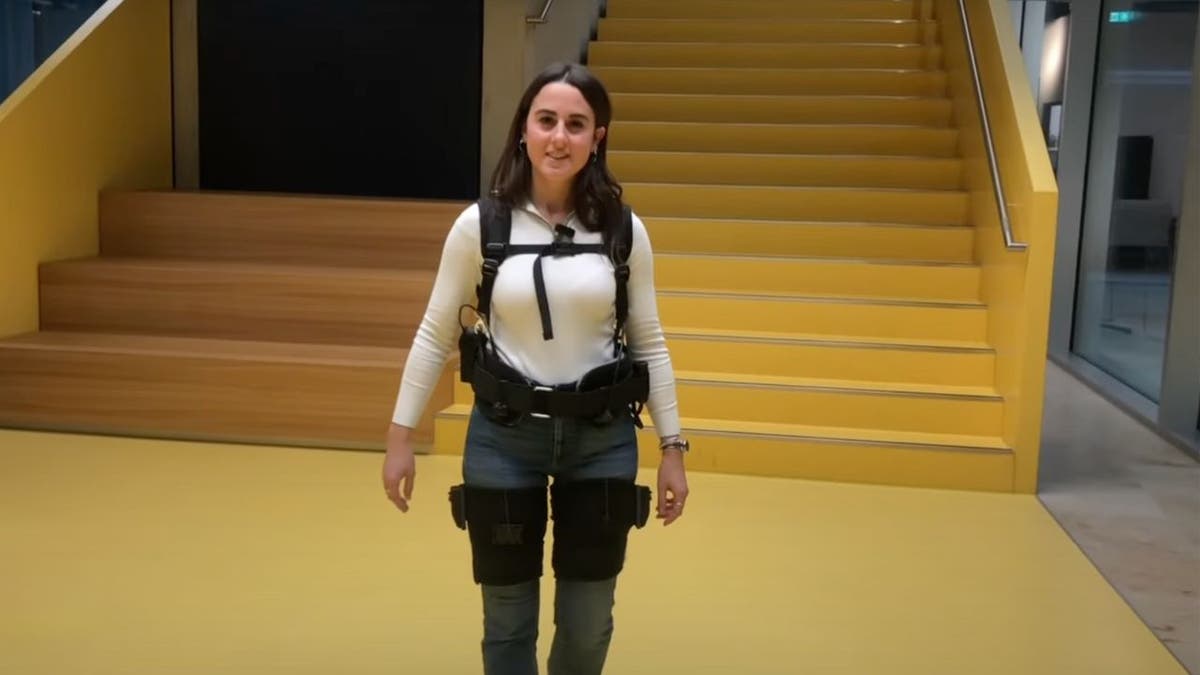
Woman wearing WalkON system (Technical University of Munich) (Kurt “CyberGuy” Knutsson)
How the robotic shorts work
The WalkON system combines sensors, artificial tendons and smart motors to enhance your natural walking motion. It starts with advanced sensors embedded in the shorts that continuously monitor the stress on your tendons. These sensors are incredibly precise, picking up on subtle changes in your movement, including how fast you’re walking and the angle of your hips.
Connected to these sensors are two thin artificial tendons that extend from your thighs to a specially designed waist belt. These tendons play a crucial role in how the system assists you. When you start to walk, the shorts analyze your gait pattern and can even detect the moment you transition from standing to walking. As each leg enters the “swing phase,” the system knows exactly when to kick in.
At just the right moment, small but powerful motors activate and gently pull on the artificial tendons. This action helps lift your thigh, reducing the effort needed by your hip flexor muscles, making it feel much easier to move. What’s really impressive is how adaptable WalkON is; whether you prefer a slow stroll or a brisk jog, the system adjusts its level of assistance based on your speed and leg weight. All of this happens seamlessly, so you experience a natural enhancement to your movement rather than feeling like you’re being pushed or pulled by a machine.
Best gifts for Men | Women | Kids | Teens | Pet lovers
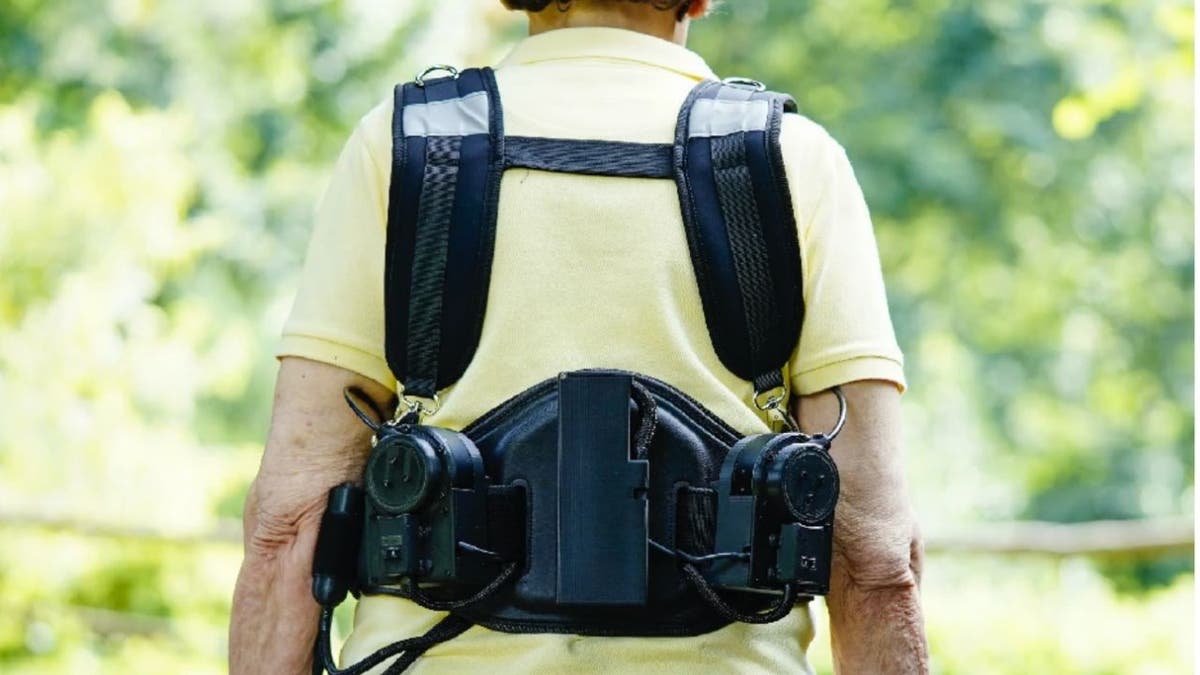
Man wearing WalkON system (Technical University of Munich) (Kurt “CyberGuy” Knutsson)
EXOSKELETON HELPS PARALYZED PEOPLE REGAIN INDEPENDENCE
Benefits of the robotic walking shorts
The WalkON system significantly reduces energy expenditure by 18% for young people walking uphill. For older individuals walking on level ground, it decreases energy expenditure by 10%. This reduction in energy expenditure is equivalent to the feeling of instantly losing 22 pounds or 13 pounds, respectively. The system allows you to walk slowly or jog, providing versatility in movement. Participants in tests reported high satisfaction with the device, giving it a mean rating of 6 out of 7 for its ability to assist while maintaining a sense of control.
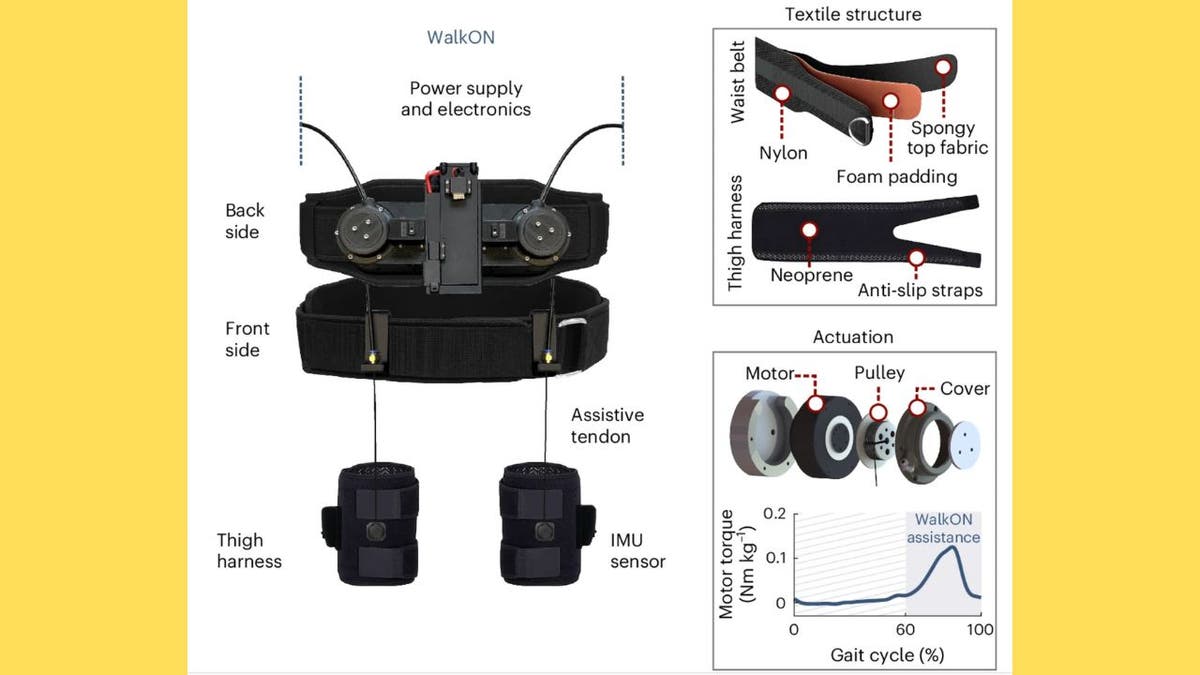
WalkON system (Technical University of Munich) (Kurt “CyberGuy” Knutsson)
COULD THESE EXOSKELETON ‘POWER PANTS’ MAKE OUTDOOR ACTIVITIES EASIER IN THE FUTURE?
Target demographics
The WalkON system can benefit anyone seeking to increase their mobility; however, it shows particular promise for older adults who may experience declining physical capabilities. Additionally, individuals weakened by illness can find significant advantages in using WalkON to enhance their mobility and independence. Furthermore, the device is designed for those looking to maintain an active and healthy lifestyle, making it a versatile solution for a wide range of users.
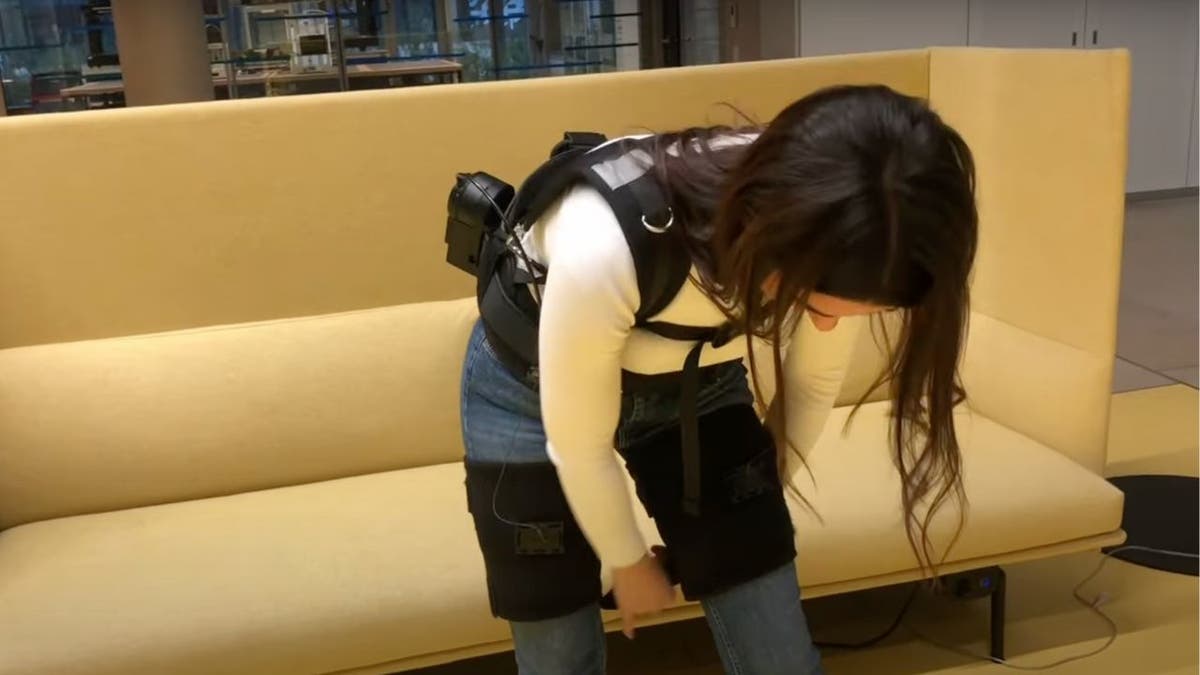
Woman wearing WalkON system (Technical University of Munich) (Kurt “CyberGuy” Knutsson)
WEARABLE EXOSKELETON CAN TURN YOU INTO A SUPERHUMAN ATHLETE
Comparison to other exoskeletons
Unlike traditional rigid exoskeletons, WalkON’s soft, flexible design offers several advantages over its more cumbersome counterparts. Conventional exoskeletons often feature rigid frames that can be difficult and time-consuming to put on, limiting their practicality for daily use.
In contrast, WalkON’s soft robotic shorts can be put on quickly and easily, similar to regular clothing, and are more than a mechanical device. Professor Lorenzia Masia, the lead researcher, aptly compares WalkON to an electric bike for walking. This analogy highlights the system’s ability to enhance natural movement without overpowering it, making mobility more accessible and appealing to a wider range of users. The lightweight, tendon-driven design of WalkON allows for a more natural range of motion, adapting to the user’s movements rather than constraining them.
Furthermore, WalkON’s compact and unobtrusive nature addresses a common concern with exoskeletons: social acceptance. Its design allows it to be worn discreetly under regular clothing, potentially increasing user comfort in social situations. This feature, combined with its efficiency in reducing metabolic cost, positions WalkON as a more practical solution for everyday use compared to bulkier exoskeleton systems.
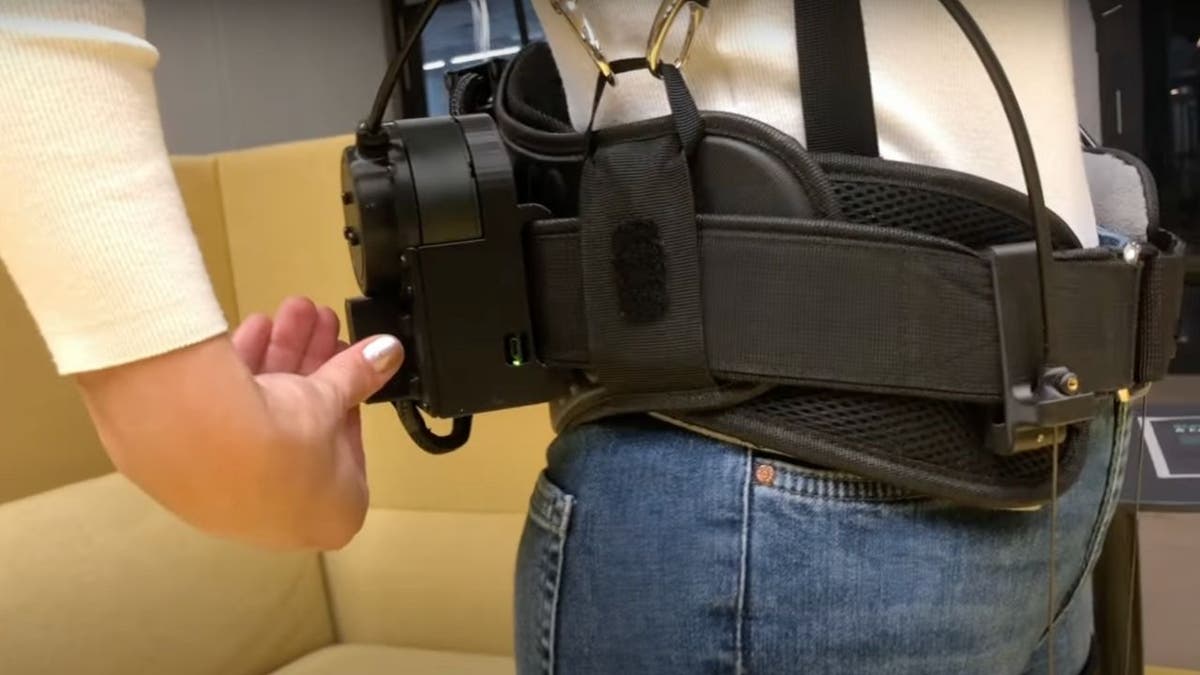
Woman wearing WalkON system (Technical University of Munich) (Kurt “CyberGuy” Knutsson)
Availability and cost
Given the current stage of development and testing, it’s likely that WalkON could be available to you within the next three to five years, pending further research and regulatory approvals.
While no exact price point is yet available, we can compare it to other assistive technologies. Current exoskeletons can cost anywhere from $40,000 to $100,000-plus. However, given WalkON’s simpler design and intended widespread use, it’s possible that it could be priced more affordably, perhaps in the range of $5,000 to $15,000 when it first hits the market. As with many technologies, the price could decrease over time as production scales up.
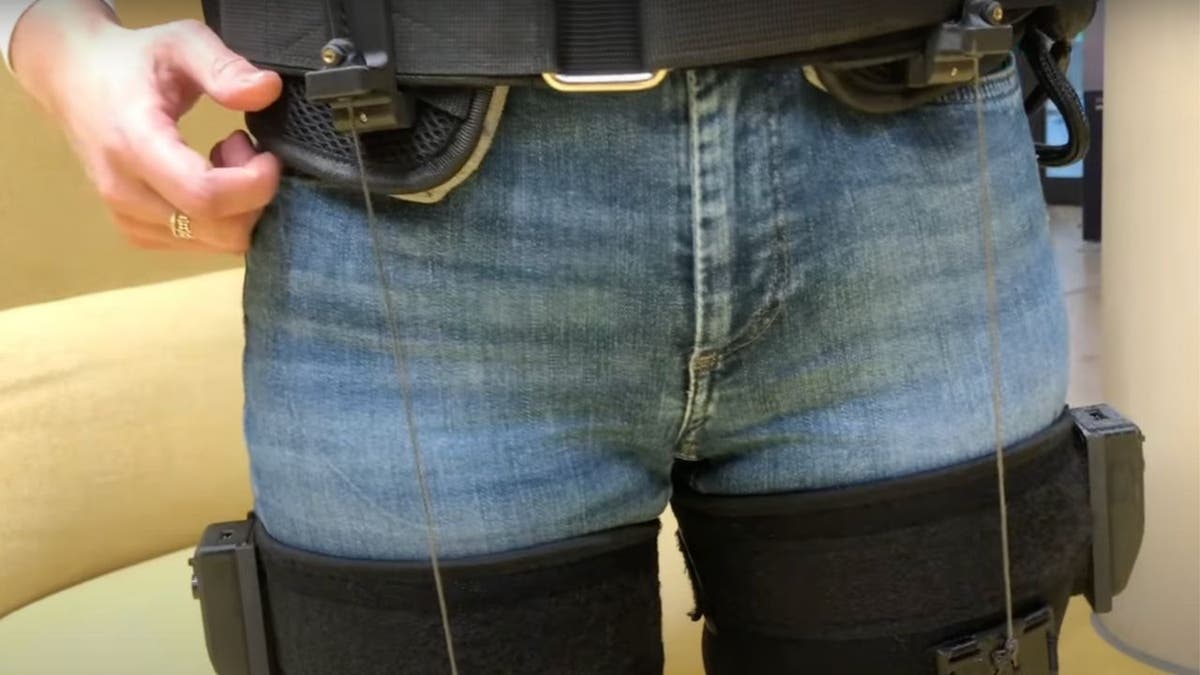
Woman wearing WalkON system (Technical University of Munich) (Kurt “CyberGuy” Knutsson)
Kurt’s key takeaways
The WalkON system’s potential to enhance mobility for people of all ages, particularly older adults and those with health challenges, is immense. By making movement easier and more efficient, WalkON could encourage more active lifestyles, potentially improving overall health and quality of life for many individuals. While questions about availability and cost remain, the development of WalkON is a promising sign that we’re moving towards more accessible and user-friendly mobility assistance solutions.
If you could design your own mobility assistance device, what features or capabilities would you include and why? Let us know by writing us at Cyberguy.com/Contact.
For more of my tech tips and security alerts, subscribe to my free CyberGuy Report Newsletter by heading to Cyberguy.com/Newsletter.
Ask Kurt a question or let us know what stories you’d like us to cover.
Follow Kurt on his social channels:
Answers to the most asked CyberGuy questions:
New from Kurt:
Copyright 2024 CyberGuy.com. All rights reserved.



